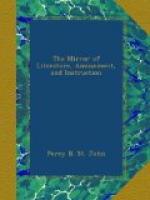The success of the Sketch-Book was followed by the almost equal fortune of “Bracebridge Hall, or the Humorists;” a series of scenes of Old English life, as displayed in one of those venerable halls, that rise, here and there, in a British landscape, as monuments of the hospitality of our ancestors, and better times. In the autobiographical chapter of this work, the writer thus pleasantly refers to his previous success, as “a matter of marvel, that a man, from the wilds of America, should express himself in tolerable English. I was looked upon as something new and strange in literature,—a kind of demi-savage, with a leather in his hand, instead of his head; and there was a curiosity to hear what such a being had to say about civilized society.” In referring the circumstances under which he writes his second work on English manners, he says: “Having been born and brought up in a new country, yet educated from infancy in the literature of an old one, my mind was filled with historical and poetical associations, connected with places, and manners, and customs of Europe; but which could rarely be applied to those of my own country. To a mind thus peculiarly prepared, the most ordinary objects and scenes, on arriving in Europe, are full of strange matter, and interesting novelty. England is as classic ground to an American, as Italy is to an Englishman; and Old London teems with as much historical association as mighty Rome.” There is, also, great amiability in the concluding paragraph:—“I have always had an opinion, that much good might be done by keeping mankind in good humour with one another. I may be wrong in my philosophy; but I shall continue to practise it until convinced of its fallacy. When I discover the world to be all that it has been represented by sneering cynics and whining poets, I will turn to and abuse it also; in the meanwhile, worthy reader, I hope you will not think lightly of me, because I cannot believe this to be so very bad a world as it is represented.”
Soon after the publication of Bracebridge Hall, Mr. Irving left this country, where he had passed two years with literary and pecuniary advantage. He quitted England with a pathetic farewell; declaring that if, as he is accused, he views it with a partial eye, he shall never forget that it is his “fatherland.” On the consanguinity of England and America too, and the cultivation of good feeling between them, he thus touchingly expresses himself in Bracebridge Hall: “We ask nothing from abroad that we cannot reciprocate. But with respect to England, we have a warm feeling of the heart, the glow of consanguinity that still lingers in our blood. Interest apart, past differences forgotten, we extend the hand of old relationship. We merely ask, do not estrange us from you, do not destroy the ancient tie of blood, do not let scoffers and slanderers drive a kindred nation from your side. We would fain be friends, do not compel us to be enemies.” There is a manly affection in these sentiments which is truly admirable.




